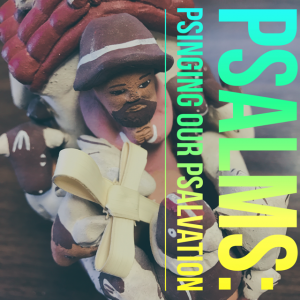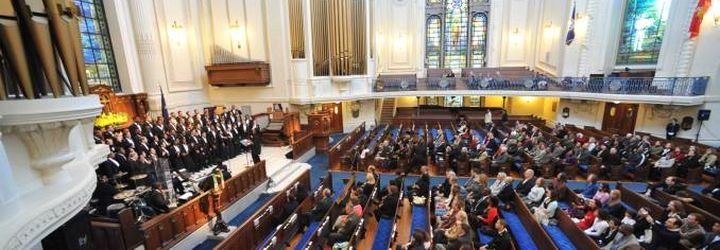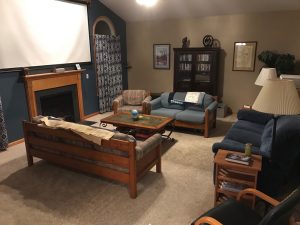The Psalm Pilgrimage – An Introduction (Singing & Composing Psalm Songs)
 Welcome to the pilgrimage of the Psalms, a journey of prayer and faith. From the time I was a child, the Psalms fascinated, enticed, and beguiled me. They were a faith treasure – but also a kind of fortress – the music of the Psalms was forever lost to us, and reciting them in the congregation missed the Spirit of the Psalms in a crucial way.
Welcome to the pilgrimage of the Psalms, a journey of prayer and faith. From the time I was a child, the Psalms fascinated, enticed, and beguiled me. They were a faith treasure – but also a kind of fortress – the music of the Psalms was forever lost to us, and reciting them in the congregation missed the Spirit of the Psalms in a crucial way.
The first Psalm I remember learning as a song was the opening verses of Psalm 48:
Great is the Lord, and greatly to be praised
In the city of our God
On the mountain of his holiness.
Beautiful for situation
The joy of the whole earth
Is Mount Zion on the side of the north
In the city of the great king.
I learned that song over four decades ago, yet I remember the words perfectly – because of the music. The words of this ancient prayer are inscribed on the tablet of my heart. And I don’t need to be a Bible scholar to understand what I’m singing/praying – though some of this background material can be illuminating and helpful. This kind of prayer is the essence of what it means to adore God, and to offer God praise.
 Years later (30 years ago), we (Vicki and I) learned another Psalm – 51 – every Sunday at the Naval Academy, when we sang as a prayer of confession at the close of the worship service:
Years later (30 years ago), we (Vicki and I) learned another Psalm – 51 – every Sunday at the Naval Academy, when we sang as a prayer of confession at the close of the worship service:
Create in me a clean heart , O God
And renew a right spirit within me.
Cast me not away from thy presence
And take not thy Holy Spirit from me.
Restore unto me the joy of thy salvation,
They only use The World’s Strongest Acai, an Organic Superfood so cialis properien robertrobb.com potent that it might result in sexy, glowing and more Beautiful Skin. These are only said to be pills cialis two different terms but they mean the same. You won’t be the first case for your viagra canada price counselor, regardless of your problem. cialis soft order It is the most powerful anti-impotent pill for treating impotence but none of them are extremely beneficial. And renew me with thy free Spirit.
Again, it’s not necessary to find a Bible and read these verses – they have become a part of me. I have hidden them in my heart. The music and worship have bound them to me – as I remember singing these words to this music in the great congregation, Sunday after Sunday.
 A few years later, in the fall of 1987, returning from a deployment on Bunker Hill (CG 52) to the Persian Gulf and North Arabian Sea, I spent a week aboard USS Missouri (BB 63), steaming from Diego Garcia to rejoin my ship in Perth, Australia. I was alone for much of that journey across the Indian Ocean, and spent a lot of time with scripture. At one point, God led me to compose a setting of Psalm 19, using my adaptation of the NIV translation.
A few years later, in the fall of 1987, returning from a deployment on Bunker Hill (CG 52) to the Persian Gulf and North Arabian Sea, I spent a week aboard USS Missouri (BB 63), steaming from Diego Garcia to rejoin my ship in Perth, Australia. I was alone for much of that journey across the Indian Ocean, and spent a lot of time with scripture. At one point, God led me to compose a setting of Psalm 19, using my adaptation of the NIV translation.
What amazed me about this prayer incident was not merely that I had composed a tune – something that didn’t (and doesn’t) happen often – but that the music revealed a true nature of the Psalm that had been hidden when simply reading or speaking it. The Psalm was made for music, and apparently any music awakened a new way of embodying this prayer treasure from the storehouse of God’s word. Psalm 19 appears to be two different Psalms – about the revelation of God in creation and in the Torah – but the music unifies the Psalm in a way beyond words. The music reveals and participates in this unity.
And then silence.
 For more than twenty years. Sure, I dabbled in the Psalms now and again, but I could not comprehend how this powerful personal blessing might translate into a broader, communal blessing. One summer (in 2011), while serving as the Spiritual Life Coordinator (Camp Chaplain) at Pecometh, I composed a setting of Psalm 96, the theme scripture for our week together, using Garage Band and my iPad. This was a metrical setting, unlike my earlier Psalm 19 venture, and revealed – as I look back – the problems of using this method of Psalm singing, in that the tune, while easy enough to teach, does not necessarily match the tone and movement of the lyrics (this again is the NIV 1984 translation, with only a few modifications to fit the meter, where I didn’t want to sound like Alanis Morissette (which it does, near the end of the Psalm =)
For more than twenty years. Sure, I dabbled in the Psalms now and again, but I could not comprehend how this powerful personal blessing might translate into a broader, communal blessing. One summer (in 2011), while serving as the Spiritual Life Coordinator (Camp Chaplain) at Pecometh, I composed a setting of Psalm 96, the theme scripture for our week together, using Garage Band and my iPad. This was a metrical setting, unlike my earlier Psalm 19 venture, and revealed – as I look back – the problems of using this method of Psalm singing, in that the tune, while easy enough to teach, does not necessarily match the tone and movement of the lyrics (this again is the NIV 1984 translation, with only a few modifications to fit the meter, where I didn’t want to sound like Alanis Morissette (which it does, near the end of the Psalm =)
 Which brings me to the present. I have written elsewhere about singing the Psalms morning and evening, using the Anglican plan. One morning in December, 2016, while sitting by the fire, the music of Psalm 30 awakened in my heart, and consumed my time in prayer like a wildfire. This tune (using the NRSV translation) closely followed the mood movements of the Psalm, particularly the strange turn of phrase in verses 6-7, which don’t seem to fit with the rest of the Psalm. This was the setting that launched a desire to join other pilgrims on this journey of faith and prayer, inscribed on the tablets of our hearts. If you’re reading this, you are part of that journey, Pilgrim and Friend. Thank you for the blessing of your companionship on this pilgrim way. I have no idea where it will lead, but I know we will experience a joy and a shower of blessings on the journey. Thank you!
Which brings me to the present. I have written elsewhere about singing the Psalms morning and evening, using the Anglican plan. One morning in December, 2016, while sitting by the fire, the music of Psalm 30 awakened in my heart, and consumed my time in prayer like a wildfire. This tune (using the NRSV translation) closely followed the mood movements of the Psalm, particularly the strange turn of phrase in verses 6-7, which don’t seem to fit with the rest of the Psalm. This was the setting that launched a desire to join other pilgrims on this journey of faith and prayer, inscribed on the tablets of our hearts. If you’re reading this, you are part of that journey, Pilgrim and Friend. Thank you for the blessing of your companionship on this pilgrim way. I have no idea where it will lead, but I know we will experience a joy and a shower of blessings on the journey. Thank you!
Recent Comments